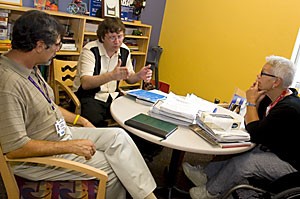Education senior Aaron Foster has overcome the challenges of mental illness and is now helping others find similar strength as he organizes events for Mental Health Awareness Week, Oct. 7-13.
“”This is a week of celebration to let the university know mental illness is not a crazy monster,”” Foster said.
As a child growing up in Hiawatha, Kan., Foster, 43, was sexual assaulted by an adult acquaintance for three years. Foster soon exhibited erratic behavior, made poor decisions and struggled with substance abuse.
“”My choice was alcohol because it took me away from everything,”” he said.
Five years ago, he realized he suffered from depression and post-traumatic stress disorder, a diagnosis he received after his third suicide attempt landed him in University Medical Center.
“”It happened in my 38th year of life, but it was the first year of my new life,”” Foster said.
Foster received health care, therapy, and psychiatric care, and over the last five years he has realized he is more than an illness.
“”I found out that I’m not some sort of sub-human or second-class citizen,”” said Foster, whose major specialty is special education and rehabilitation. “”I’m a human being.””
Approximately 20 percent of Americans suffer from mental illness , according to the National Institutes of Health.
Mental illnesses are medical conditions that disrupt a person’s thinking, feeling, mood, ability to relate to others and/or daily functioning. They often result in a diminished capacity for coping with the ordinary demands of life, according to the National Alliance on Mental Illness.
Serious mental illnesses include major depression, schizophrenia, bipolar disorder, obsessive-compulsive disorder, panic disorder, post-traumatic stress disorder and borderline personality disorder, according to the alliance.
“”I lived my life in a time and space that did not recognize mental illness,”” Foster said. “”It was still considered a theological problem well into the ’70s.””
This week, Foster decided in conjunction with his therapist that he no longer needed regular therapy, and over the past five years he has reduced his prescriptions to one daily medication.
“”My life is more autonomous than it has ever been,”” he said. “”I make my own decisions. I own my mistakes. I’m in the position to help myself now, and I can help other people.””
To kick off the event, a candlelight vigil will be held from 6-8 p.m. Sunday at the west side of Old Main. Shirley Scott, vice mayor of the City of Tucson, will attend to support the week and present a proclamation.
All week, the UofA Bookstore will display in a window 10 books about people who have come to terms with mental illnesses, as well as basic facts and myths about mental illness.
Students can attend a mental health fair on the Mall from 10 a.m. to 2 p.m. Tuesday. The fair will include depression screenings and booths with information.
In addition, the Gallagher Theater will present the award-winning documentary “”Out of the Shadow,”” about a woman grappling with schizophrenia, Wednesday at 1:30 p.m.
Foster said he hopes individuals will use the events to work toward overcoming their obstacles and help erase the stigma of mental illness.
“”Be aware. Don’t be afraid of the stigma,”” Foster said. “”Reach out to those you can trust. It’s a long journey, but recovery is possible.””









